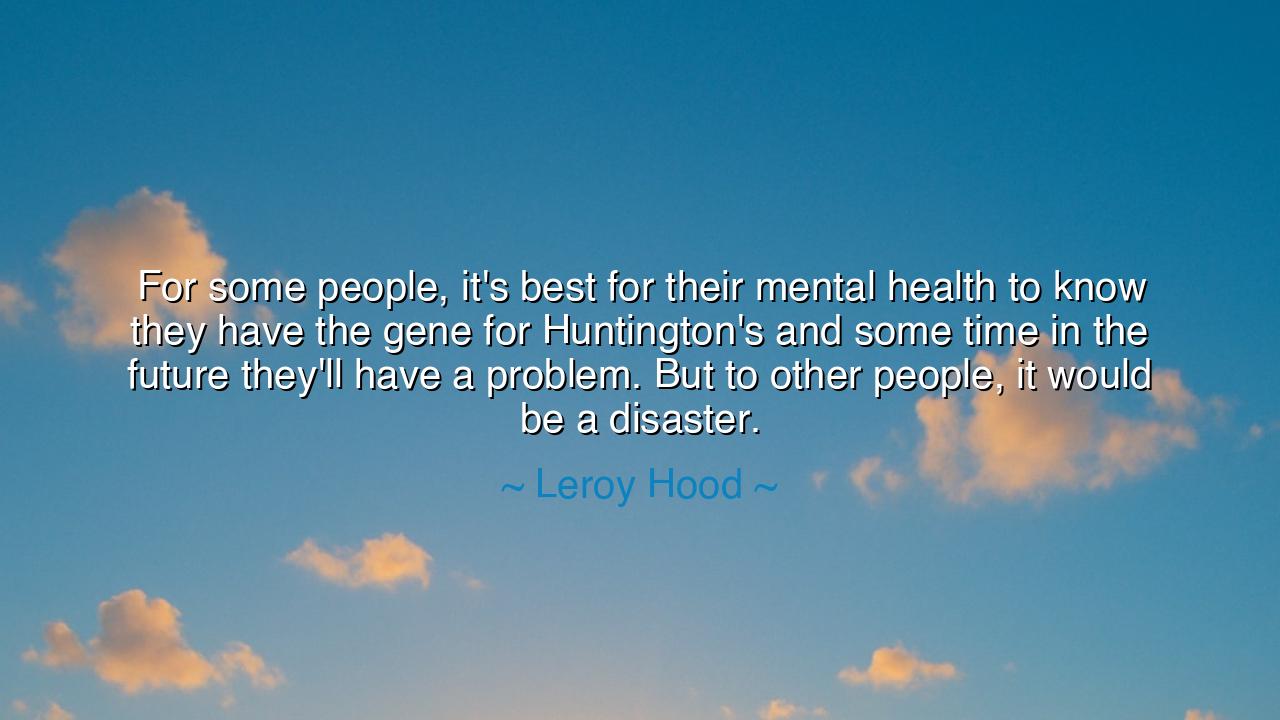
For some people, it's best for their mental health to know they
For some people, it's best for their mental health to know they have the gene for Huntington's and some time in the future they'll have a problem. But to other people, it would be a disaster.






The Knowledge That Heals and the Knowledge That Wounds
Hear now the words of Leroy Hood, a pioneer of modern biology and a seeker of truth in the mysteries of life itself: “For some people, it's best for their mental health to know they have the gene for Huntington's and some time in the future they'll have a problem. But to other people, it would be a disaster.” These words are not merely about a single disease—they speak of the eternal conflict between knowledge and peace, between the human desire to know and the burden that such knowledge brings. Hood’s wisdom reminds us that the mind is both sanctuary and battlefield, and that truth, though noble, is not always light—it can also be fire.
The Meaning of the Teaching
To know the future is to touch the edge of divinity, and yet the human heart was not always built to bear such weight. Hood speaks of the Huntington’s gene, a cruel marker hidden in the strands of one’s DNA, whispering the promise of illness that will one day unfold. But beyond genetics, his words hold a universal message: knowledge can heal, but it can also harm, depending on the spirit that receives it. Some find strength in truth—they prepare, they adapt, they face their destiny with courage. Others, overwhelmed by fear, crumble beneath the shadow of what is to come. Thus, knowledge is not wisdom until it is measured by the heart’s readiness.
The Origin of the Words
Leroy Hood, a master of molecular science, helped unlock the secrets of the human genome. Through his work, humankind gained the power to see within the code of life itself—to know not only who we are, but what fates may await us. Yet even as science advanced, Hood understood that truth without compassion can destroy as easily as it can save. He saw that in the age of knowledge, the new challenge was not discovery, but understanding the human soul that must live with discovery’s consequences. His quote arose from the very heart of this paradox: that progress and peace do not always walk hand in hand.
The Parable of Pandora’s Box
In the tales of old, the gods gave Pandora a box filled with all the world’s evils, warning her not to open it. But curiosity—a hunger for knowledge—overcame her, and when she lifted the lid, sorrow and disease escaped into the world. Only hope remained inside. This ancient story is reborn in Hood’s reflection. Humanity, like Pandora, has opened the box of its own design—the genetic code—and from it flows both hope and despair. To know one’s destiny can empower, or it can enslave. Yet, as in the myth, the lesson is not to curse knowledge, but to wield it with reverence and compassion, keeping hope as the anchor of the soul.
The Dual Edge of Truth
For those who carry the Huntington’s gene, the truth of their fate is both a torch and a chain. Some find peace in clarity—they can plan their lives, cherish each sunrise, and prepare their families. They master fear through understanding. But others, once told of the storm that lies ahead, lose their light in dread and sorrow, long before the illness ever touches them. Hood’s words reveal that truth is not absolute—it takes shape according to the vessel that holds it. To some, it is strength. To others, it is poison. Therefore, one must seek not only knowledge, but also wisdom, which teaches when to seek and when to rest in mystery.
The Lesson of Readiness
The wise do not flee from truth, but neither do they grasp it recklessly. They learn to ask: Am I ready to know? For every truth has its season. The farmer does not dig up the seed to see if it grows; he trusts the process and waits for the right time. Likewise, in life, some knowledge must come when the spirit is strong enough to bear it. Mental health, as Hood reminds us, is the soil in which truth must be planted. If the soil is not prepared, even the most precious knowledge can wither the heart. Thus, wisdom lies not in how much we know, but in how deeply we understand ourselves.
The Lesson for All Generations
Therefore, O listener, take heed of this teaching: seek knowledge with humility, and hold it with grace. Ask not only what is true, but what is right for me to know now. When truth comes, meet it not with fear, but with the steadiness of a mind rooted in hope. Help others bear their truths gently, for not all hearts are equal in strength. Let compassion guide the hands that carry discovery, lest wisdom turn to pride and knowledge to despair.
The Eternal Counsel
Thus, the voice of Leroy Hood joins the chorus of the wise through the ages: knowledge is power, but power without tenderness wounds the spirit. The future may be written in the code of our genes, but destiny still bows to courage. Whether one chooses to know or not to know, the greater task remains the same—to live each day fully, to cherish each breath deeply, and to walk forward with both truth and hope as companions on the path. For even in the shadow of uncertainty, the soul that chooses peace has already conquered fate.






AAdministratorAdministrator
Welcome, honored guests. Please leave a comment, we will respond soon